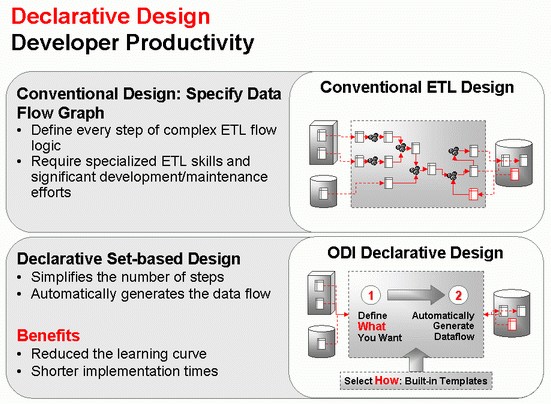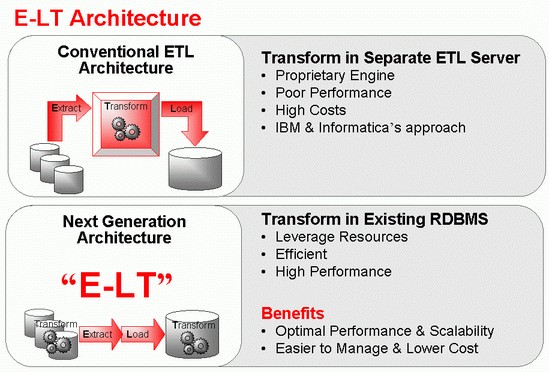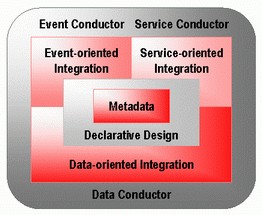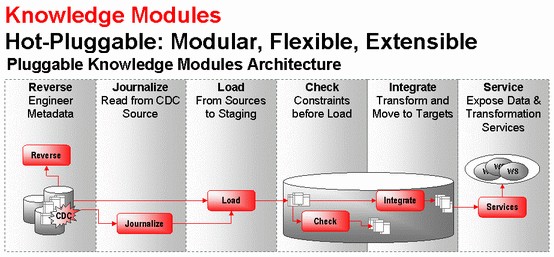Declarative design
Traditional “Extract, Transform and Load” (ETL) tools closely intermix data transformation rules with the integration process procedure, requiring the development of both :
- data transformation
- and data flow
ODI-EE take a different approach to integration by clearly separating the declarative rules (the “what”) from the data flows (the “how”).
With ODI-EE, declarative rules describing mappings and transformations are defined graphically and stored independently from the implementation.
Data integration designers describe source and target data formats and data integration processes. The business user or the developer can focus on describing what to do, not how to do it. ODI EE then generates, deploys and manages the code required to implement those processes across the various source and target systems.
Oracle Data Integrator Enterprise Edition also provides advanced ETL capabilities such as :
- loading slowly changing dimensions,
- complex data integration process flow logic,
- re-usable mappings,
- and design-time automation through scripting.
Oracle Data Integrator Enterprise Edition includes built-in dimensional modeling tools to simplify Oracle Data Warehouse integration implementations.
Data quality firewall
Oracle Data Integrator ensures that faulty data is automatically detected and recycled before insertion in the target application. This is performed without the need for programming, following the data integrity rules and constraints defined both on the target application and in Oracle Data Integrator.
ELT architecture
Better execution performance
Traditional ETL software is based on proprietary engines that perform data transformations row by row, thus limiting performance. By implementing an E-LT architecture, based on your existing RDBMS engines and SQL, you are capable of executing data transformations on the target server at a set-based level, giving you much higher performance.
Instead of relying on a separate, conventional ETL transformation server, Oracle Data Integrator Enterprise Edition’s E-LT architecture generates native code for disparate RDBMS engines (SQL, bulk loader scripts, for example). E-LT architecture extracts data from sources, loads it into a target, and transforms it using the database power. By leveraging existing databases and database expertise, Oracle Data Integrator Enterprise Edition provides unparalleled efficiency and lower cost of ownership. By reducing network traffic and transforming data in the database containing the target tables, E-LT architecture delivers the highest possible performance.
Simpler and more efficient architecture
The E-LT architecture removes the need for an ETL hub server sitting between the sources and the target server. It utilizes the target server and its RDBMS to perform complex transformations, most of which happen in batch mode when the server is not busy processing end-user queries. Platform Independence: Oracle Data Integrator supports all platforms, hardware and OSs with the same software.
Cost-savings
The elimination of the ETL hub server and ETL engine reduces both the initial hardware and software acquisition and maintenance costs. The reduced learning curve and increased developer productivity significantly reduce the overall labor costs of the project, as well as the cost of ongoing enhancements.
Hot Pluggable - Data Connectivity
Oracle Data Integrator Enterprise Edition provides heterogeneous support for 3rd party platforms, data-sources, and data warehousing appliances. While Oracle Data Integrator Enterprise Edition leverages optimizations for Oracle Database to perform EL-T data movement, transformation, data quality and standardization operations, Oracle Data Integrator Enterprise Edition is compatible with mixed targets, sources and applications.
Oracle Data Integrator supports all RDBMSs including all leading Data Warehousing platforms such as Teradata, IBM DB2, Netezza, Oracle, Sybase IQ and numerous other technologies such as flat files, ERPs, LDAP, XML.
Real-Time Data Warehousing - Active Integration Platform
The benefits of an active integration platform is a seamless batch and real-time integration.
- Batch, Event based and service-oriented architecture,
- Evolve from batch to near real-time data integration,
- services plug into oracle soa suite,
- data integrity on the fly
Oracle Data Integration Suite turns the promise of real-time data integration into reality by providing all key components required to enable real-time data warehousing and operational data hubs.
Additional native hooks to Oracle SOA Suite provide comprehensive and hot-pluggable (working seamlessly with existing systems) data services integration.
Oracle Data Integrator Enterprise Edition combines three styles of data integration:
- data-based,
- event-based,
- and service-based.
Oracle Data Integrator Enterprise Edition unifies silos of integration by transforming large volumes of data in batch, by processing events in real time leveraging its advanced Changed Data Capture, and by providing data services to the Oracle SOA Suite.
Knowledge Modules Architecture
Benefits :
- Tailor to existing best practices
- Ease Administration Work
- Reduce cost of ownership
Knowledge Modules are at the core of the Oracle Data Integrator Enterprise Edition architecture. They make all Oracle Data Integrator Enterprise Edition processes modular, flexible, and extensible.
Knowledge Modules implement the actual data flows and define the templates for generating code across the multiple systems involved in each process. Knowledge Modules are generic, because they allow data flows to be generated regardless of the transformation rules. And they are highly specific, because the code they generate and the integration strategy they implement are finely tuned for a given technology.
Oracle Data Integrator Enterprise Edition provides a comprehensive library of Knowledge Modules, which can be tailored to implement existing best practices (for example, for highest performance, for adhering to corporate standards, or for specific vertical know-how).
By helping companies capture and reuse technical expertise and best practices, Oracle Data Integrator Enterprise Edition’s Knowledge Module framework reduces the cost of ownership. It also enables metadata-driven extensibility of product functionality to meet the most demanding data integration challenges.
Sample of Available Knowledge Modules:
- General SQL DB
- Oracle DB 9i
- Oracle DB 10g
- Oracle DB 10g EX
- Oracle DB 11g
- IBM DB2/390
- IBM DB2/400
- IBM DB2/UDB
- IBM Informix SE
- IBM LDAP Server
- MS SQL Server 2000
- MS SQL Server 2005
- MS SQL Server 2005 SE
- MS Office Access 2000
- MS Office Excel 2000
- MS Active Directory
- Sybase ASA 8.x & 9.x
- Sybase ASE 11.9 & 12.5
- Sybase IQ 12.x
- Sonic MQ v7.0
- SAP ERP and BW
- Teradata V2R5.0
- Teradata V2R6.0
- Teradata R12
- Netezza Performance Server 2.x
- Netezza Performance Server 3.x
- Netezza Performance Server 4.x
- Hyperion Essbase
- PostgresSQL 8.1
- MySQL 4.0
- MySQL 5.0
- Oracle BI Suite 10g
- Oracle BAM 10g
- Oracle Internet Directory 9i
- OpenLDAP 2.3
- Oracle Siebel CRM 7.8
- Oracle JD Edwards
- Oracle PeopleSoft
- Oracle E-Business Suite
- Oracle AQ 10g
- Oracle SOA Suite / ESB 10g
- SalesForce.com AppExchange




